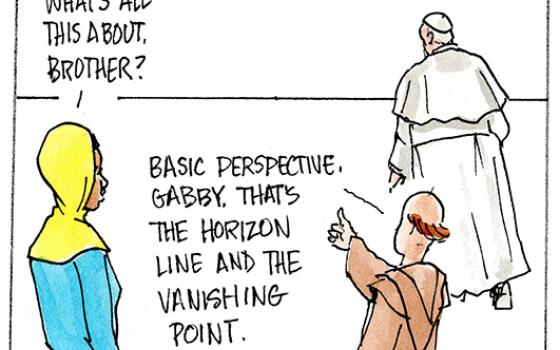Supporters of comprehensive immigration reform gather near the U.S. Capitol in Washington Dec. 6, 2017. (CNS photo/Tyler Orsburn)
The U.S. bishops' migration committee chairman Sept. 15 welcomed a move by House members to include language in the $3.5 trillion budget reconciliation bill to provide a pathway to U.S. citizenship for beneficiaries of the Deferred Action for Childhood Arrivals program and other immigrants.
"We are pleased that the House Committee on the Judiciary has taken this important step, setting up an opportunity for many undocumented persons to receive legal status and a pathway to citizenship," said Auxiliary Bishop Mario E. Dorsonville of Washington, who heads the U.S. Conference of Catholic Bishops' Committee on Migration.
"Undoubtedly, Catholic social teaching will be implicated by many aspects of this budget reconciliation bill, but this is a welcome milestone for many families and the common good," he said in a statement.
Bishop Dorsonville added: "For decades, the bishops of the United States have been proponents of such reforms, which promote integration and family unity. We cannot persist in relegating these members of our society to the margins, especially when we simultaneously depend on so many of them for our collective well-being."
If the budget reconciliation bill passes, the language on citizenship would apply to those covered by DACA, often called "Dreamers," as well as Temporary Protected Status holders, Deferred Enforced Departure beneficiaries, and agricultural workers and other essential workers who are in the country without legal permission.
The full House of Representatives and the U.S. Senate will need to incorporate this language into their respective final versions of the budget reconciliation bill; both chambers will need to pass the bill and President Joe Biden must sign it into law before it takes effect.
Advertisement
The language approved by the House Judiciary Committee was among several priorities that five USCCB committee chairmen urged Senate and House members to incorporate in their respective final versions of the budget bill.
In a Sept. 7 letter to all members of Congress, the committee chairmen outlined several priorities: integrating migrants and refugees; safeguarding jobs for the poor and vulnerable; strengthening families; expanding access to early childhood education; ensuring "safe, decent and affordable housing"; caring for creation; preserving religious liberty; and respecting the rights and dignity of every human life in health care.
Besides Bishop Dorsonville, the other committee chairmen who signed the letter were: Cardinal Timothy M. Dolan of New York, Committee for Religious Liberty; Archbishop Joseph F. Naumann of Kansas City, Kansas, Committee on Pro-Life Activities; Archbishop Paul S. Coakley of Oklahoma City, Committee on Domestic Justice and Human Development; and Bishop Michael C. Barber of Oakland, California, Committee on Catholic Education.
"As we continue to work toward a more comprehensive reform of our immigration system — one that acknowledges and respects the God-given dignity of every person — we welcome this crucial step," Bishop Dorsonville said in his Sept. 15 statement about the House Judiciary Committee's action.
Echoing the Sept. 7 letter, he said: "We call on both the House and Senate to include these provisions in the final reconciliation bill and for Congress to pass a bill that helps all those on the margins of our society, strengthens families, protects religious freedom, promotes care for creation, and respects the rights and dignity of every human life, from conception to natural death."





